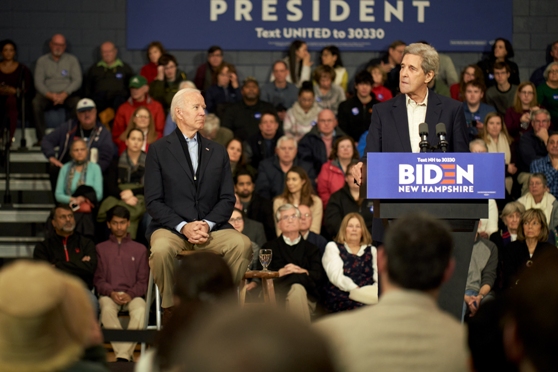Much changed world, same Joe Biden seeking to undo what Trump has done

By Katie Glueck, Matt Flegenheimer and David E. Sanger
WILMINGTON, Del. — The Tuesday (18) night speaking line-up for the Democratic convention was always intended as a muscular contrast on foreign policy and diplomatic integrity, presented to viewers under the evening’s unsubtle theme: ‘Leadership Matters’.
There were two former commanders-in-chief, Bill Clinton and Jimmy Carter, and a former chairman of the Joint Chiefs turned chief diplomat: Colin Powell. There was Sally Q. Yates, the former deputy attorney general who famously warned the White House in early 2017 that Michael Flynn, President Donald Trump’s first national security adviser, had lied about his Russian contacts.
“When this president goes overseas, it isn’t a goodwill mission — it’s a blooper reel,” Kerry said. “He breaks up with our allies and writes love letters to dictators.”
Earlier in the day, Kerry sent a fundraising email that made even clearer that Biden was the person who could “begin the hard work of putting back together the pieces of what Donald Trump has smashed apart”.
But putting back the pieces is probably not a feasible option, with global affairs straying a great distance from the status quo Biden might recall from the last time he stepped out of the Situation Room.
The relationship with China has turned poisonous. Biden’s party, still reeling from Russia’s election interference in 2016, has become more hawkish on dealing with Moscow than Republicans who once cast themselves as the party of national security. North Korea has turned a project to build a few bombs into an arsenal that rivals India’s and Pakistan’s, and reconstituting the Iran deal, if that is even possible, is unlikely to change the fundamental tensions dividing the Middle East.
Biden has offered few detailed policy plans to address how he would tackle this very changed world. Instead, the broad message of the virtual convention came down to this: Trust a man who ran the Foreign Relations Committee, who participated in the decisions to take out Osama bin Laden with a commando strike and Iran’s nuclear centrifuges with a cyber strike, and who would arrive at the White House with an experienced team.
To Trump and his supporters, that is Biden’s vulnerability. They say he stands for the establishment foreign policy that the current administration took office to destroy.
Biden, in turn, is arguing that Trump has allowed adversaries to undercut American interests, coddling strongmen, heartening the Russians and cutting deals for his friends.
By day’s end, the gravity of this split — and Biden’s long-running campaign theme of country-over-party leadership at home and abroad — had been reinforced by the latest turn in the seemingly ceaseless drama of Russia and the Trump 2016 campaign.
A Republican-controlled Senate panel released an extensive report detailing the web of connections between the Trump operation and Russian government officials and others with ties to the country’s intelligence services.
With the proceedings on Tuesday night, Democrats supplied a compelling counterpoint to a nation still getting its head around a disquieting truth: A foreign power tried to sabotage the last American presidential election, and some in Trump’s circle were open to the help.
The roster of allies who spoke Tuesday evening hinted at the kind of president Biden would like to be — a model that Democrats believe will resonate more powerfully with each revelation of Trumpian hostility to diplomatic norms.
Rep. Lisa Blunt Rochester, D-Del., a co-chair of Biden’s presidential campaign, described a sharp divide between Biden and Trump on matters of “experienced leadership, compassionate leadership, qualified leadership.”
This view is in many ways a culmination of the pitch Biden and his allies have been pressing since the start of his campaign last spring: that he, a former vice president who spent decades steeped in foreign policy as a senator, was uniquely equipped to repair tattered relationships abroad and to assume the commander-in-chief role at home after four years of uncertain and destabilizing leadership under Trump.
Biden has surrounded himself by trusted veterans of the Democratic foreign policy establishment including Antony J. Blinken and Jake Sullivan, two of his former national security advisers in the White House. His team is stacked with Obama-era foreign policy hands who are not promising radical departures from that administration. Instead they are betting that a renewed emphasis on multilateral engagement, a clear message about America’s role in the world and the empowering of foreign policy experts — along with scientists — will help to steady a rocky international landscape.
Doing much of this work, Biden has long believed, will require the cooperation of Republicans, a perspective that seemed to inform the itinerary Tuesday night. In elevating Powell as the spokesman for the Republican national security establishment that has fled Trump, the Democratic nominee was turning to a Biden-esque internationalist, who as chairman of the Joint Chiefs and then as secretary of state, argued that America is most powerful when it works with allies.
If the evening’s thesis was often that Biden could be counted on with the nation’s most sensitive national security predicaments, the headliner on Tuesday moved to expand the point closer to home.
For the evening’s marquee speech, Jill Biden, the candidate’s wife, resolved to address the convention from Room 232 at Brandywine High School, where she once taught, drawing on her long career in education and her rolling side gig as a public advocate for her husband.
The implication, against the backdrop of a mismanaged pandemic that threatens the upcoming school year, was unmistakable: The Bidens know how to take care of families, and Trump has failed them.
“I know if we entrust this nation to Joe, he will do for your family what he did for ours,” Jill Biden said. “Bring us together and make us whole.”
-New York Times

